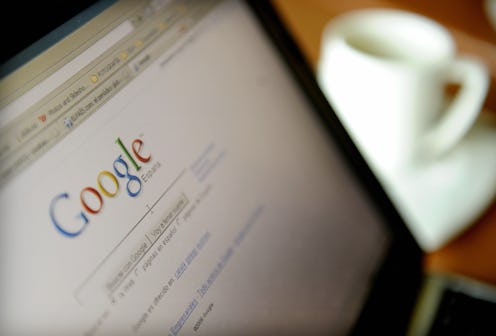Life
Our Image Search Results Reveal Our Biases
You can learn a lot from Google image search results, from what far off places look like to the fact that modern biases are alive and well. For instance, as one Imgur user recently pointed out, "boy" on a Google Image search turns up pictures of children; "girl," on the other hand, turns up images of adult women. Because that's not infantilizing at all — in that "ugh, it is so infantilizing" kind of way.
"It's disrespectful to call an adult a boy," the user DekuScrub7 wrote when he or she psoted the Imgur page showing the results to Reddit. "But [it's] normal to call an adult a girl unless [she's] beyond middle age. What does this say about the status of women?" My answer, like the answer of most of the commenters, is that it's a sign of how women are not afforded the status as fully independent, adult humans in the public consciousness. And you can see this problem everywhere, from the personal level of things like mansplaining, to the macro level where politicians try to make women's healthcare decisions for us.
Plus, as several Redditors point out, it's also tied to the way women are reduced to sexual objects. "[Not] too far down the search you'll start coming up with pornographic images when searching 'girl', but not with 'boy,'" EpicFailer10 pointed out.
But this isn't the only Google image search to turn up some unsettling social biases. Much like Google autofill, Google image results can show us a lot about the way the world works, often in uncomfortable ways. The worst part? The top results are the top results because they were popularized by Google users, not (obviously) by the company itself. These examples? They're all on us.
1. "Beautiful Woman"
I'm far from the first person to point this out, but it bears frequent repeating. The women who show up on a Google image search for "beautiful" skew very, very white. Which is very indicative of the suffocating and pervasive nature of white, Western beauty standards, in all their damaging glory. In real life, white women don't have anything close to a monopoly on beauty — so why don't our image searches reflect the diversity in beauty and vice versa?
2. "Child" and "Baby"
Following shooting deaths of black children from Trayvon Martin to Tamir Rice, people have observed that black children are not afforded the same assumption of childlikeness as white children, being seen as dangerous rather than innocent. This bias is borne out by psychological studies as well, and by Google image results where children once again skew white. And babies even more so.
Note how here they include a separate "black" section, because everyone knows black babies aren't the same as just "babies."
3. "Fried Chicken"
There's nothing racist about the images on this search themselves, but the first search suggestion on the page is "watermelon." No. Just no.
4. "Mexican" vs. "American"
This is what the search results for "American" look like — national pride and strength and prestige coming out the ears. But search "Mexican," and it's a completely different story.
Internet, if I'd wanted offensive and cartoonish stereotypes, I would have search for that.
5. "Terrorist"
Despite the fact that most acts of terrorism in America are committed by white men, frequently of far right political ideologies, and the fact that the oldest and most established terrorist organization in the country is the Ku Klux Klan, which is still allowed to operate, the images of terrorists that come up in searches are distinctly Middle Eastern, Muslim, and/or Arab.
6. "Muslim"
The top results could be worse, but it seems pretty clear that not only do people associate terrorism with Muslims, as shown above, but also that they associate Muslims with violence, as suggested by several of the top results picked out here. And also the idea that Obama is a Muslim is still bizarrely popular.
7. "Lesbians" and "Gay/s"
Search for "lesbians" on Google Images, and it's pretty clear most of the top results are intended for the male gaze. Yes, we know that straight men find lesbians hot, but that shouldn't define their identity in search results. At least not in a more just world.
And the results for either "gay" or "gays" aren't a lot better.
Please note: LGBT people are more than just sex, and in fact can wear clothes.
8. "Gay Lifestyle" vs. "Straight Lifestyle"
On that note, if you look for images of the "gay lifestyle," you either find people condemning it, or people mocking the people who condemn it. Which is all about what you'd expect. But interestingly, if you search for "straight lifestyle" you get a whole bunch of paraphernalia for straight-edge stuff. Which is not the same thing. Thus proving that all the talk about "gay lifestyle" is pretty dumb. And yet we still have to deal with it.
9. "Business Woman" vs. "Business Man"
Both of these search results turn up a bunch of stock photos for most of the top images (which also skew pretty white, though I suppose they could be worse). But if you notice, the suggested searches for women include well-known business women like Sheryl Sandberg. The search results for businessmen include no such thing, which probably indicates that businessmen are so common that they assume either you weren't searching for a specific one or they couldn't possibly provide individual suggestions.
Basically, you can tell a lot from our image searches — whether you want to or not.
Images: Imgur; Emma Cueto/Bustle (15)
